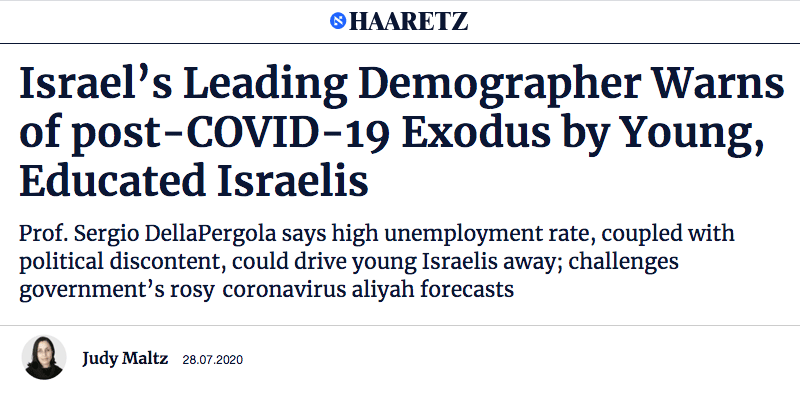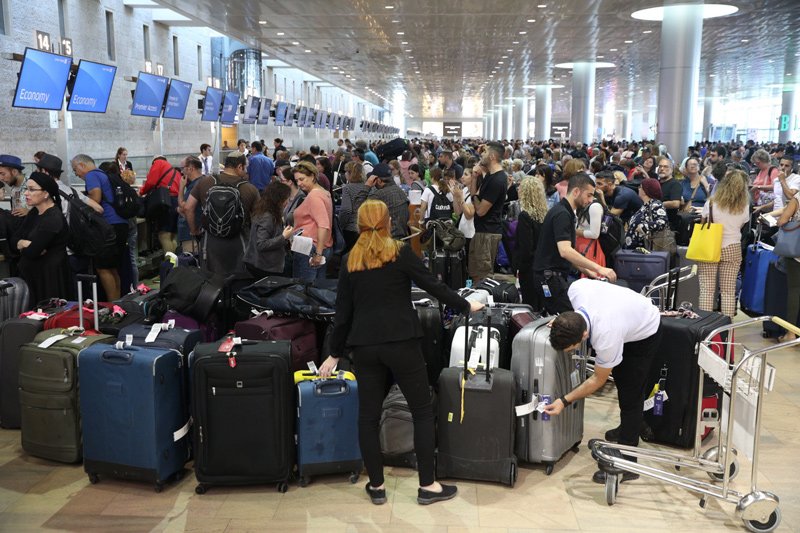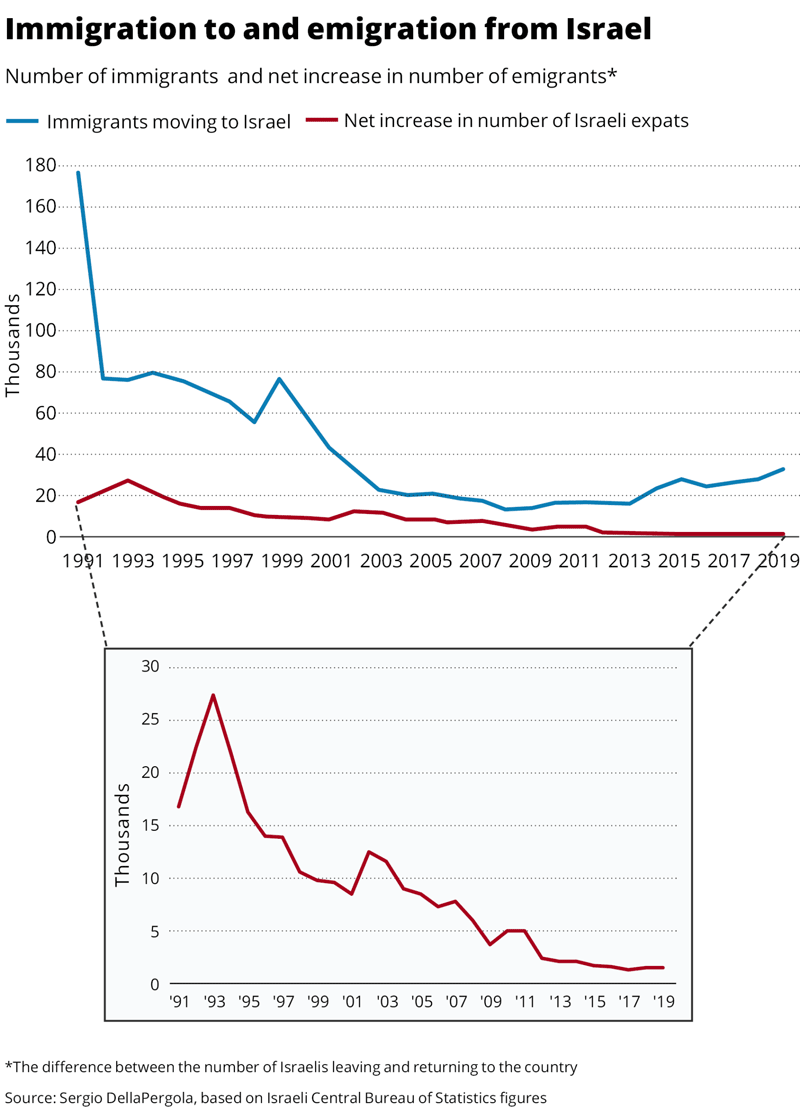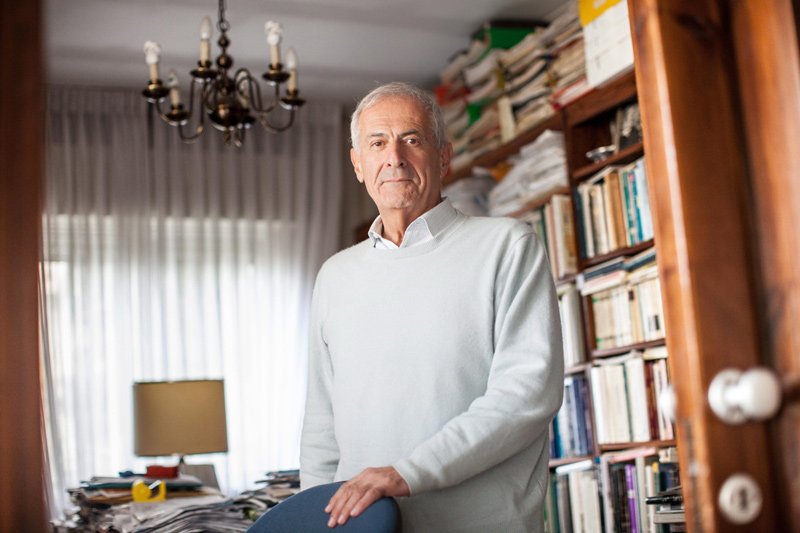

Barring a dramatic economic recovery, Israel will face a massive post-pandemic wave of emigration, the country’s leading demographer warns.
In an interview with Haaretz, Prof. emeritus Sergio Della Pergola also described recent predictions of a coronavirus-related spike in immigration to Israel as fanciful.
Such predictions have been published by the Jewish Agency, the Immigrant Absorption Ministry, Nefesh B’Nefesh – the organization responsible for immigration from North America – and the Knesset Committee for Immigration, Absorption and Diaspora Affairs.
“I pray that I’m wrong, but I’ve been doing population projections for 40 years – and, unfortunately, I’m usually right,” said DellaPergola, who worked at the Hebrew University and is widely regarded as the dean of Jewish demographers. “It looks like all those making these predictions are operating on the basis of hopes and fears rather than rationality,” he said.
DellaPergola said his own projections were based on a new, yet-to-be-published research study which found that unemployment rates, both in Israel and the immigrants’ countries of origin, could explain aliyah trends better than many other variables.

“If you add to the equation the fiasco of how Israel has handled the coronavirus, not only should we not expect a big wave of aliyah, but what I predict is a huge wave of yerida,” he said, using the Hebrew term for Jews leaving Israel. “It will be mainly young and educated Israelis.”
Della Pergola noted that in the past 10 years, net emigration from Israel – the difference between the number of Israelis leaving the country and the number of expats returning – had reached a record low. He attributed the drop to low unemployment in Israel during this period. “In fact, it has been lower here than in the United States and everywhere in Europe besides Germany,” he said.
Just before COVID-19 struck in March, unemployment in Israel was running at less than 5 percent. It is currently in excess of 20 percent, with nearly 1 million Israelis out of work.
Della Pergola said the state of the economy would not be the only factor fueling emigration.
“The political discontent of many young Israelis – something we are seeing in the streets these days – also has to be taken into account,” he said, referring to the growing protest movement that has attracted thousands of young people. The protesters have been demanding that Prime Minister Benjamin Netanyahu step down because of the corruption charges he faces and because of his mishandling of the coronavirus crisis.
“Many young Israelis don’t see a future in the country anymore,” Della Pergola said, “and this is something tragic that’s not being discussed. The disenchantment of these people with the government, together with high unemployment, can turn into something truly explosive. And I don’t see any politicians, or even officials at the Jewish Agency, who understand this.”

Key factor
DellaPergola said he had shared his projections at a meeting with senior officials at the Jewish Agency last week. Asked to describe their response, he recalled: “They said, ‘Thank you. Very interesting.’”
In recent years, some 30,000 immigrants have arrived in Israel each year – the majority of them from former Soviet bloc countries. Only about 10 percent come from the United States.
Aliyah was down 50 percent in the first six months of 2020, compared with same period last year, with barely 8,200 immigrants moving to Israel. The downturn has been attributed mainly to logistical problems arising from the pandemic.
However, since the coronavirus crisis erupted, aliyah organizations have been reporting a dramatic increase in the number of files being opened by Jews around the world applying to immigrate to Israel. They attributed this rising interest to Israel’s success in combating the first wave of the virus in March and April.
In an interview with Haaretz last week, Immigrant Absorption Minister Pnina Tamano-Shata said that based on past experience, 80 percent of those who open aliyah files ultimately move to Israel. DellaPergola said in response that this rate “doesn’t sound realistic.”
The Jewish Agency has estimated that once the coronavirus crisis has passed, 250,000 immigrants will arrive in Israel over the course of five years. Tamano-Shata has spoken about 90,000 by the end of 2021.
Although Israel has failed to rein in the second wave of the virus, these aliyah forecasts have not been adjusted.
DellaPergola’s latest study examined how unemployment rates have affected aliyah from eight different countries since 1991.
Immigrants from Russia, Argentina and Mexico, according to his findings, tended to be more influenced by unemployment rates in their home countries when considering aliyah than by the rate of unemployment in Israel. As a result, high unemployment rates in these countries were often accompanied by high aliyah numbers from them.
By contrast, immigrants from the United States, South Africa, Turkey, Italy and France tended to be more influenced by the unemployment rate in Israel than by unemployment rates in their homelands. In other words, low unemployment in Israel was often accompanied by higher aliyah numbers from these countries.
While ideology could often explain the decision in principle to move to Israel, DellaPergola said, more often than not unemployment explained the timing of the move.
About a decade ago, he said, based on a survey conducted in the United States, the Jewish Agency had predicted a massive increase in aliyah among American Jews to at least 20,000 a year. “Of course this never happened, and I told them it wouldn’t,” DellaPergola said, “and they were very angry with me.”
He said he was skeptical that aliyah from the United States would increase because of the pandemic, as organizations like Nefesh B’Nefesh have predicted.
“The roots of the Jewish working population in America are so deep, so successful and so extensive,” DellaPergola noted, “that you don’t just give that up to move to a smaller country with a much smaller market and with fewer opportunities for mobility.”
He said it was likely that a substantial share of the immigrants in the coming years would be “needy people who have no alternative,” or Jews who are highly ideologically motivated – “the type who go straight to a hilltop settlement in the West Bank.”
But, he added, “these are a very tiny minority.”